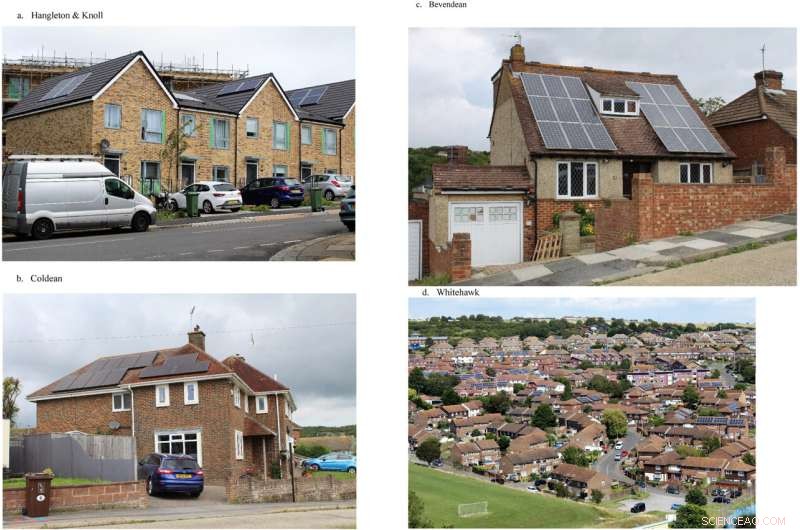
Wetenschap
Zon schijnt op de rijkste:nieuwe studie onderzoekt hoe zonne-PV voor iedereen haalbaar kan worden

Bemonsteringsstrategie voor gemeenschapsinterviews en buurtbezoeken in vier gebieden van Brighton and Hove, Verenigd Koninkrijk. Krediet:Energiebeleid (2022). DOI:10.1016/j.enpol.2022.112868
Er is meer overheidssteun met meer flexibiliteit nodig om zonnepanelen een haalbare optie te maken voor oudere huiseigenaren, studentenhuurders en gehandicapten, waarschuwt nieuw onderzoek van de University of Sussex Business School.
Het onderzoek roept op tot beleidsinitiatieven zoals fiscale prikkels en subsidies om de kosten van het installeren van zonne-energie in buurten met hoge achterstand te helpen verlagen. De academici bevelen aan om recente renteloze leensystemen voor elektrische voertuigen uit te breiden met de installatie van fotovoltaïsche panelen als onderdeel van een flexibeler beleid dat de specifieke zonne-uitdagingen van verschillende huishoudens aanpakt.
Uitbreiding van bedrijfsmodellen voor gedeeld eigendom, met inbegrip van coöperaties of door de gemeente geleide programma's die de plaatsing en het onderhoud van zonne-energie aanbieden aan huizen die niet kunnen betalen, zou studenten, huurders en niet-huiseigenaren helpen om ook te profiteren van de plaatsing van zonne-PV, beveelt het document aan dat vandaag in de tijdschrift Energiebeleid. Hoewel bestaande regelingen door huishoudens werden verwelkomd om te helpen bij de uitrol van PV-systemen, identificeerde de studie latere problemen die de noodzaak benadrukken van een heroverweging van dat beleid om ervoor te zorgen dat ze alert zijn op opkomende ongelijkheden.
Uit het onderzoek bleek dat huishoudens het leven met PV-systemen op heel verschillende manieren ervaren en niet altijd het maximale voordeel kregen. Het onderzoek identificeerde enkele huiseigenaren die hun opwekking van zonne-energie gebruikten om het toegenomen gebruik van elektrische apparaten zoals tv's, wasdrogers in de zomer en bubbelbaden te rechtvaardigen. De onderzoekers suggereren dat progressieve energietarieven of in-home displays, als onderdeel van een pakket van breder energiebewustzijn en maatregelen ter vermindering van de vraag, dit rebound-gedrag zouden kunnen ontmoedigen.
De auteurs identificeerden de behoefte aan beleid dat tegemoetkwam aan de uitdagingen van onderhoud, reparatie, verwijdering en herfabricage van zonne-PV-systemen en niet alleen hun installatie, inclusief uitgebreide producentenverantwoordelijkheid en terugnameregelingen voor kapotte of gepensioneerde zonnesystemen om een groeiend afvalprobleem in de industrie aan te pakken .
Bovendien pleiten de onderzoekers ervoor dat maatregelen om PV rechtvaardiger en circulairder te maken, ongelijkheden zullen aanpakken die verder gaan dan huishoudens ten goede komen en teruggrijpen in toeleveringsketens. De studie beveelt strikte industrienormen aan voor transparantie van de toeleveringsketen, inclusief wijzigingen aan de Modern Slavery Act 2015 om alle koolstofarme technologieën aan te pakken, om ervoor te zorgen dat de overgang naar een koolstofarme economie in het VK niet rechtstreeks verband houdt met arme, illegale of onmenselijke arbeidspraktijken binnen wereldwijde toeleveringsketens voor zonne-energie.
Benjamin K Sovacool, hoogleraar energiebeleid in de Science Policy Research Unit (SPRU) aan de University of Sussex Business School, zei:
"Onze studie constateert dat de toepassing van zonne-energie de ongelijkheden op veel verschillende manieren kan vergroten, waaronder de beschikbaarheid voor verschillende groepen mensen en afhankelijk van het feit of iemand zijn huis huurt of bezit. Er zijn ook verschillen in termen van waar mensen in het VK wonen en de beschikbaarheid of a skilled workforce or infrastructure to support solar power, inequity in the way that pollution and waste can impact nature, and a generational imbalance in the future burdens of maintenance and repair and rebounds in energy consumption.
"Our study uncovers previously unexplored inequities, notably the dominance of patriarchal figures in making decisions and having control over household energy, the exclusion of the elderly, student renters, or the disabled, the temporal risk of breakdowns and unexpected failures, and qualitative explanations for solar rebounds."
Dr. Marie Claire Brisbois, Senior Lecturer in Energy Policy in the Science Policy Research Unit (SPRU) at the University of Sussex Business School, said:
"With solar power predicted to grow 30-fold by 2050 and with the potential to meet more than half the globe's electricity demand by the start of the next decade, it is vital that no section of society is left behind in this energy revolution."
The study centered around a novel framework looking at demographic inequities (between groups), spatial inequities (across geographic scales), interspecies inequities (between humans and non-humans), and temporal inequities (across present and future generations).
The researchers analyzed the experience of solar inequities amongst a small sample of early adopters and residents in Brighton and Hove (ranking 205th out of 391 UK local authorities reporting PV installations) to understand how their experiences compared with injustices detailed in research literature and how these experiences might inform policies for a more socially just future rollout of solar PV.
The study identified social awareness of inequities amongst hosts of solar PV systems, and outlines measures that can be taken within solar policy and strategy to improve the justness of future deployments.
- Demographic inequities, such as unfair adoption patterns within social groups often categorized by gender, income, age, or race, can be partially remedied by cheaper, smaller systems or shared ownership business models.
- Spatial inequities, such as lack of access to clean air in local environment, can be offset by targeted skills training or policy incentives that seek to even out geographic adoption patterns.
- Interspecies equity, including the destruction of ecosystems, habitats, and extinction of non-human species, can be addressed by more sustainable extraction of solar PV's raw minerals or stronger recycling and waste requirements.
- Temporal inequities, such as shifting burdens onto future generations or issues of intergenerational equity, can be addressed through innovations in technology (especially inverters &via recycling PV materials) and extended producer responsibility.
Adrian Smith, Professor of Technology and Society in the Science Policy Research Unit (SPRU) at the University of Sussex Business School, said:
"Our fossil-fueled energy systems have already caused iniquitous climate change impacts; policy-makers need to make sure measures for rolling out alternatives, like solar energy, realize their potential for more sustainable and just outcomes."
Dr. Max Lacey-Barnacle, Research Fellow in Just Transitions in the Science Policy Research Unit (SPRU) at the University of Sussex Business School, said:
"The recent announcement by the UK Government around increasing energy security through greater deployment of renewables features an aim to triple the amount of solar power in the UK by 2030.
"In light of this announcement, solar advocates, manufacturers, and policymakers can least afford to ignore the mounting justice issues associated with current patterns of adoption, particularly if this pace of adoption is tied to increasing energy security concerns. Through directly addressing or acknowledging some of the inequities we have outlined in our paper, policymakers can facilitate future solar schemes that may foster greater social acceptance and enhance more equitable outcomes."
 Aspiratiesymptomen bij babyvogels
Aspiratiesymptomen bij babyvogels  Categorie twee orkaan Irma vormt zich in het oosten van de Atlantische Oceaan
Categorie twee orkaan Irma vormt zich in het oosten van de Atlantische Oceaan Wat kinderen ons kunnen leren over zorg voor het milieu
Wat kinderen ons kunnen leren over zorg voor het milieu Mensen zouden hun consumptiegewoonten veranderen om het klimaat te helpen, studie vondsten
Mensen zouden hun consumptiegewoonten veranderen om het klimaat te helpen, studie vondsten VN bevestigt 18,3C recordhitte op Antarctica
VN bevestigt 18,3C recordhitte op Antarctica
Hoofdlijnen
- 10 vreemdste bronnen voor antibiotica
- Babymanta's:nieuw licht op hun leven in Indonesische waterspeeltuin
- Halve werelden vogels in verval, soorten die steeds sneller uitsterven
- Symbiotische schimmels suggereren biocontrole-implicaties voor plaagkevers
- De wortels van biodiversiteit:hoe eiwitten verschillen tussen soorten
- Hoe slaapwandelen werkt
- Kunnen algen de geheimen van fotosynthese ontsluiten?
- De in 1995 opgegraven Plesiosaurus bleek een langnekkig zeereptiel te zijn
- Hoe de percentages van adenine in een DNA-streng te berekenen
- Mistharp oogst water, zelfs in de lichtste mist

- Monsterkartelaanklacht remt BMW-inkomsten

- Weg, het spoor, boot:Sandia transporttriatlon stelt verbruikte splijtstof op de proef

- Het einde van webneutraliteit, het einde van het internet?

- China's grote drie luchtvaartmaatschappijen vragen 737 MAX uitbetalingen van Boeing:rapporten

 Ultradunne gespoten MXene-antennes zijn klaar voor 5G
Ultradunne gespoten MXene-antennes zijn klaar voor 5G India zegt dat Chinese constructie op rivier het water vervuilt
India zegt dat Chinese constructie op rivier het water vervuilt Hoogtepunt:quasi-kristallijne bestelling op nanoschaal
Hoogtepunt:quasi-kristallijne bestelling op nanoschaal Waarom laten eekhoorns hun haar af?
Waarom laten eekhoorns hun haar af?  Techleiders pleiten voor meer regulering van sociale media
Techleiders pleiten voor meer regulering van sociale media Wetenschappers maken geluidsgolven vanuit een kwantumvacuüm in het Black Hole-laboratorium
Wetenschappers maken geluidsgolven vanuit een kwantumvacuüm in het Black Hole-laboratorium Verwacht deze zomer weer een enorme klodder algen op Lake Erie
Verwacht deze zomer weer een enorme klodder algen op Lake Erie Hoe wiskunde en taal kunnen worden gecombineerd om de wereld in kaart te brengen en sterke wachtwoorden te maken, met behulp van de kracht van drie willekeurige woorden
Hoe wiskunde en taal kunnen worden gecombineerd om de wereld in kaart te brengen en sterke wachtwoorden te maken, met behulp van de kracht van drie willekeurige woorden
- Elektronica
- Biologie
- Zonsverduistering
- Wiskunde
- French | Italian | Spanish | Portuguese | Swedish | German | Dutch | Danish | Norway |

-
Wetenschap © https://nl.scienceaq.com

